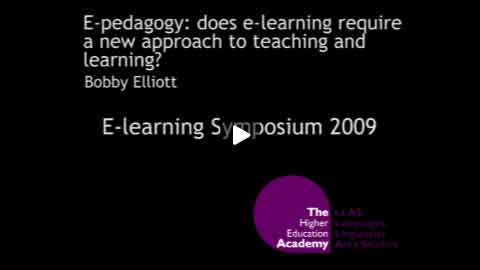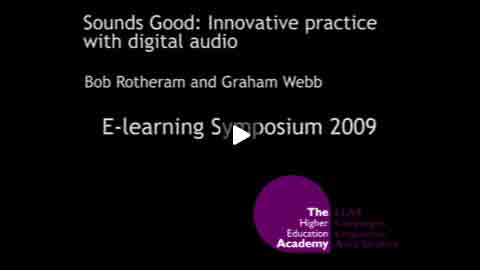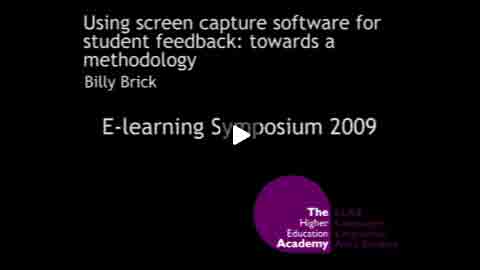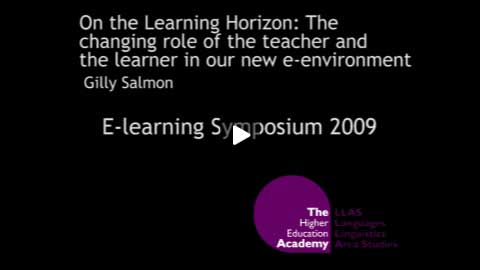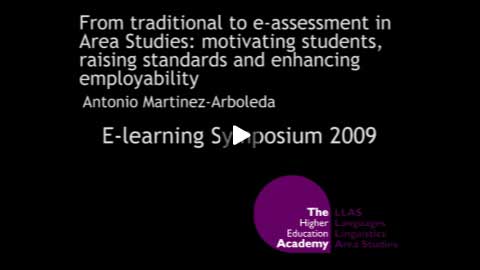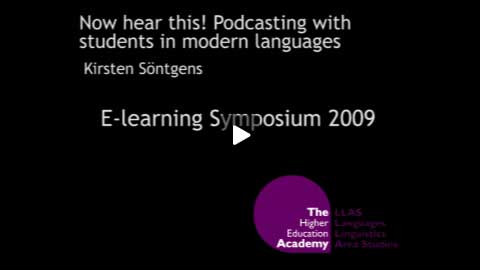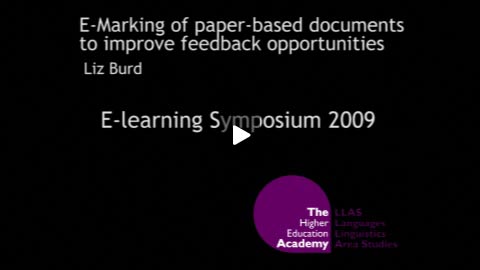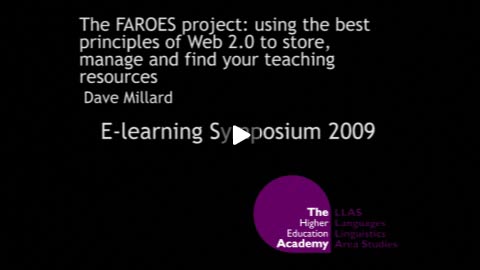e-Learning symposium 2009
Date: 29 January, 2009 - 30 January, 2009
Location: Avenue Campus, University of Southampton
Event type: Symposium
Location map | Programme | Abstracts

The Subject Centre's 4th Annual e-Learning symposium will feature the following keynote speakers:
- Professor Gilly Salmon, Professor of e-learning and Learning Technologies at the University of Leicester
- Bobby Elliott, Scottish Qualifications Agency
- Bob Rotheram, National Teaching Fellow and Reader in Assessment, Learning and Teaching, Leeds Metropolitan University
Topics to be covered will include:
- the changing role of the teacher and the learner in our new e-environment;
- an exploration of whether there is need for an e-pedagogy in our teaching and assessment;
- descriptions and analysis of the use of audio recording software to provide feedback and make podcasts
- using Camtasia to provide feedback on written work
- integrating online debating into Spanish content classes
- innovative uses of eAssessment in languages
- presentation of a newly-developed digital resource-storehouse with Web 2.0 features
Pre-symposium workshop: 29 January 2009
The symposium on 30th January, will be preceded by a day of workshops which will include the following four options. Each of the workshops will run twice during the day and participants will be asked to select their two preferred options in advance of the day. The day is being sponsored by the Centre for Excellence in Multimedia Language Learning (CEMLL) who are making 10 bursaries available for the event. To apply please contact CEMLL directly using the attached form by 12th December 2008. Successful applicants will be informed by 9th January 2009 but in order to guarantee your place please complete the Subject Centre booking form indicating that you are applying for a bursary for the event.
1. Making and using podcasts with students
facilitated by Rose Clark and John Wrigglesworth, University of Portsmouth:
This workshop is based on the recent successful ‘6 Ps in a podcast’ workshops run by Portsmouth and LLAS. In a seminar-type session, participants will be introduced to the basic software required to make a pedagogical audio file; have the opportunity for some hands-on practice, and will address practical issues, such as the nature and role of scripts, and implications of adding graphics, text and video. The session will also consider the implications for the teacher of moving to an online/blended learning environment.
2. Creating your own online learning materials the easy way
facilitated by Kate Borthwick and Alison Dickens, Subject Centre LLAS:
This workshop will be relevant for teachers with an interest in, but little experience of online materials development. It will involve the introduction of a new, free tool called LOC (Learning Object Creator), for the authoring of online learning material, which is simple to learn to use and includes in-built pedagogical guidance for the creation of effective materials. Participants will be introduced to the principles of online materials development, will get a chance for some hands-on practice using the tool and will be given a support pack to help in the planning and continuing development of their own material.
3. Translation and Interpreting
Sponsored and facilitated by The Centre for Excellence in Multimedia Language Learning (CEMLL)
This workshop will include general ideas for using multimedia and Web tools for these two applied areas of language teaching; translation and interpreting. Pedagogical ideas on combining the use of an online wiki, electronic dictionaries and a VLE for developing translation skills will be shared, as well as the use of audio recorders/editors and voice tools for fostering interpreting skills. Reference will also be made to specific language-lab software such as Sony Virtuoso and Soloist (for creating interpreting exercises) and translation industry software, such as Trados.
4. Task-based Learning
Sponsored and facilitated by The Centre for Excellence in Multimedia Language Learning (CEMLL)
In this workshop, language practitioners will share ways in which to engage students through multimedia-based activities. The philosophy behind task-based learning is that students engage in a task or real-life activity with a defined objective such as solving a problem, negotiating a situation, obtaining information, or sharing an experience. By emphasizing student involvement and student authoring of materials, tasks such as designing and conducting surveys, re-ordering, editing and subtitling video clips, composing crosswords, and recording interviews can create meaningful opportunities for learners to use language. A variety of widely-available, easy-to-use electronic resources will be employed in this workshop, including free audio and video editing software (Audacity, Windows Movie Maker), quiz creation software (Hot Potatoes) and online survey tools (freeonlinesurveys.com).
The Centre for Excellence in Multimedia Language Learning (CEMLL) workshops will comprise a combination of demonstration, discussion and practical hands-on activities in exploiting multimedia resources for language teaching and learning. Workshop materials will also be made available on a USB pen drive which will be given to each individual participant during the event.
| Time | Session |
|---|---|
| 09.30 - 10.00 | Registration |
| 10.00 - 10.40 | E-pedagogy: does e-learning require a new approach to teaching and learning? Bobby Elliott, Scottish Qualifications Agency |
| 10.40 - 11.15 | Sounds Good: Innovative practice with digital audio Bob Rotheram, National Teaching Fellow and Reader in Assessment, Learning and Teaching; and Graham Webb, Head of Languages, Leeds Metropolitan University Example feedback [MP3] (1.8MB) |
| 11.15 - 11.45 | Using screen capture software for student feedback: towards a methodology Billy Brick, Language Centre Manager, Coventry University |
| 11.45 - 12.15 | Coffee |
| 12.15 - 13.00 | On the Learning Horizon: The changing role of the teacher and the learner in our new e-environment Gilly Salmon, Professor of e-learning and Learning Technologies at the University of Leicester |
| 13.00 - 14.00 | Lunch |
| 14.00 - 14.30 | From traditional to e-assessment in Area Studies: motivating students, raising standards and enhancing employability Antonio Martinez-Arboleda, Senior Teaching Fellow, Department of Spanish, Portuguese and Latin American Studies, University of Leeds |
| 14.30 - 15.00 | Now hear this! Podcasting with students in modern languages Kirsten Söntgens, German Language Coordinator, University of Southampton |
| 15.00 - 15.40 | E-Marking of paper-based documents to improve feedback opportunities (+ a video link to Durham’s technocafe) Liz Burd, Senior Lecturer and Deputy Dean, Department of Computer Science, University of Durham |
| 15.40 - 16.00 | The FAROES project: using the best principles of Web 2.0 to store, manage and find your teaching resources Dave Millard, Assistant Professor, Department of Electronics and Computer Science, University of Southampton |
Abstracts
E-pedagogy: does e-learning require a new approach to teaching and learning?
Bobby Elliott
Teaching practice has changed little during the last century. It is argued that the classical pedagogies are timeless and not subject to the whims of technological change. The proponents of change argue that the learning environment has fundamentally changed and that pedagogy must evolve to reflect this new reality. This presentation explores this argument and examines what, if any, are the implications of an “e-pedagogy” for assessment.
Sounds Good: Innovative practice with digital audio.
Bob Rotheram and Graham Webb
Using recorded tapes and cassettes is not new in language teaching but digital audio
has greater potential, in this and other fields of higher education, particularly in delivering assessment and feedback of different kinds. This session will present findings and good practice tips from 'Sounds Good: Quicker, better assessment using audio feedback', a project funded by the Joint Information Systems Committee (JISC). There will also be an account of a project run at Leeds Metropolitan with students of Spanish, which successfully used voice tools to facilitate peer communication.
Using screen capture software for student feedback: towards a methodology
Billy Brick
The presentation will demonstrate a new method of providing feedback on language students’ written work via wmv files, created using Camtasia screen capture software and delivered to students’ mail within Blackboard Vista. The process of creating such files will be described and some of the practical and technical difficulties will be identified. Finally, the presentation will also report on students’ evaluation of this method, and discuss pedagogical issues associated with providing feedback, including student motivation, and learning styles and preferences.
On the Learning Horizon: The changing role of the teacher and the learner in our new e-environment
Gilly Salmon
This presentation will take us on a short journey to the future and explore the new technologies on our screens and in our hands, and wonder whether they will be in our hearts. It will show the signposts that indicate the changes coming up and their implications for learners and teachers in Higher Education.
Not for the faint hearted.
From traditional to e-assessment in Area Studies: motivating students, raising standards and enhancing employability
Antonio Martinez-Arboleda
In this session, the use of online assessment methods in Spanish content modules will be discussed, focusing in particular on how assessed e-debates, role-plays and tasks can enhance students' learning experience. By exploring specific examples of e-assessment, this presentation will reflect upon the merits of traditional assessment patterns within Area Studies modules - essays and exams - and offer a fresh alternative to some learning and teaching conventions in Higher Education. Issues such as the limitations of the essay as an effective way to exercise key intellectual and communicative skills, the need to enhance student employability, and recruiting onto modern languages degrees will be discussed in this presentation.
Now hear this!: Podcasting with students in Modern Languages
Kirsten Söntgens
The arrival of web 2.0 has seen changes in the way ‘users’ can interact with the world wide web. Users have become active creators of content rather than predominately passive receivers, and the publication of audio and video content in an educational setting has gained favour among school and university educators. The creation of podcasts by students and tutors now plays a major role in Modern Languages curricula, and can be seen to enhance learner-motivation, independence and collaborative working.
This presentation will outline the factors that have played a part in the introduction of podcasts into Modern languages curricula; and some of the most recent podcast projects in the area of language learning & teaching will be reviewed. Finally, the results of a pedagogic research project conducted in 2007-8 with a group of 25 undergraduate students of German, who produced podcasts in small groups as part of a series of ‘German radio broadcasts’ will also be presented. Drawing on students’ podcasts as well as research data, this session will shed light on the question of how far podcasts can lead to enhanced motivation, independence and collaboration.
E-Marking of Paper Based Documents to Improve Feedback Opportunities (and a video link to Durham’s technocafe)
Liz Burd
This presentation will consider the provisional outcomes of a new investigatory project run in Durham to consider the opportunity for eMarking of examination scripts. The outcomes of the work will be discussed including the perceptions of both staff and students of the scheme. There will also be a video link to Durham's technocafe.
Durham requires most examination scripts to be double marked and does not return scripts to students. These issues are problematic for student learning as the sequential nature of double marking means that feedback is slow and failure to return scripts means that any feedback given to students either is difficult to produce or lacks context. This project will electronically scan scripts and therefore enable simultaneous marking and enable results of the marking process to be easily returned to students. There is also an additional benefit of the work in that the storage of paper copies of scripts no longer needs to be stored.
The FAROES Project: using the best principles of Web 2.0 to store, manage and find your teaching resources
Dave Millard
This presentation will showcase the EdShare Language Box, an innovative resource repository for language teachers that takes the best-practice principles of Web 2.0 sites - that they are social, interlinked, evolving, flexible, visually exciting and easy to use – and applies them to storing, managing and sharing teaching resources. Think: YouTube meets language teaching!
The Language Box has been created for the JISC-funded FAROES project, and the presentation will outline the research and development work with language teachers which underpins the repository’s creation; and demonstrate the Language Box in action.
Past events
This event follows on from the success of the e-Learning symposiums in December 2005, February 2007 and January 2008.

